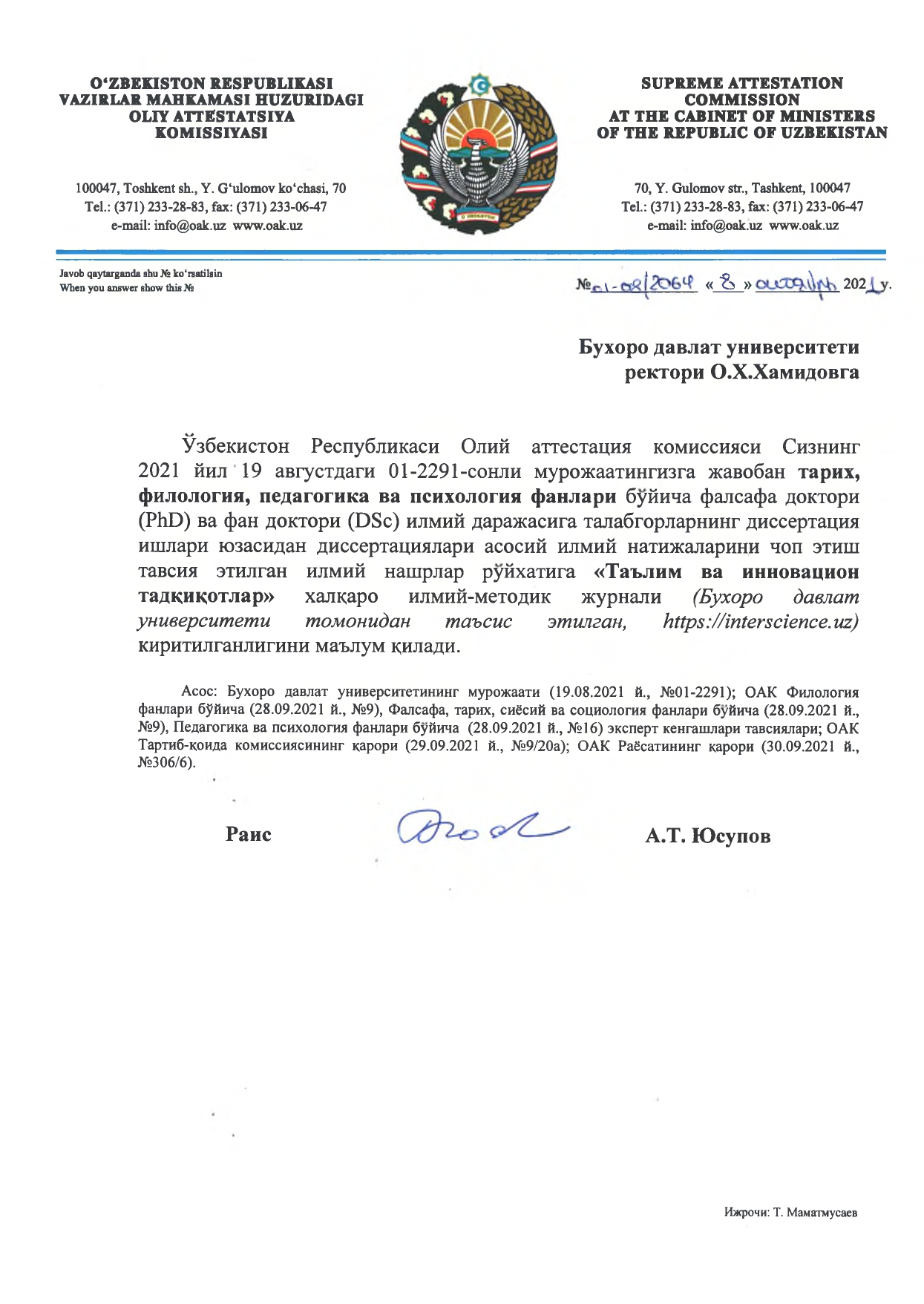YOZUVNING XORIJIY TILNI (INGLIZ TILI) O’RGANISHDAGI ROLI
Jabborova Dilafro’z Ismatullo qizi Qarshi Davlat universiteti tayanch doktoranti, Qarshi muhandislik iqtisodiyot institutida o’qituvchi
Ключевые слова:
yozuv, xorijiy til, yozuv kompetensiyasi, piktografik yozuv, ideografik yozuv, fonografik yozuvАннотация
Ushbu maqolada xirijiy tilni (ingliz tili) o’rganishda yozuvning o’rni haqida fikr yuritilgan. Yozuvning kelib chiqish tarixi va yozuv haqidagi olimlarninh qarashlari muhokama qilingan. Bundan tashqari, maqolada yozuv kompetensiyasi haqida munozara yuritilgan bo’lib, kompetensiya termini olimlarning fikrlari yordamida yoritib berilgan.
Библиографические ссылки
Videoselektor 2021-yil 6-may. Elektron manba: https://kun.uz/uz/63333992
Elektron manba: https://lex.uz/uz/docs/426736?ONDATE=12.05.2022%2000
Musayev, B., & Nazirova, Z. (2022). Yozuvning kelib chiqish tarixi va uning rivojlanish bosqichlari. Oriental renaissance: Innovative, educational, natural and social sciences, 2 (11), 474-482.
Irisqulov M. T “Tilshunoslikka kirish”, Toshkent- “Yangi asr avlodi”. – 2009. 220-225.
Зимняя И. А. Ключевые компетенции-новая парадигма результата образования //Высшее образование се- годня. – 2003. – №. 5. – С. 34.
Литонина Н. В. Формирование учебно-познавательной компетенции школьников средствами иностранно- го языка //Иностранные языки в школе. – 2012. – №. 6. – С. 69-74.
Sattorova F. Lingvistik kompetensiyaning ingliz tilini xorijiy til sifatida oʻqitishdagi ahamiyati //Uzbekistan: Language and Culture. – 2021. – Т. №. 2.
White R. W. Motivation reconsidered: the concept of competence //Psychological review. – 1959. – Т. 66. – №. 5. – С. 297.
Зимняя И. А. Ключевые компетенции-новая парадигма результата образования //Высшее образование се- годня. – 2003. – №. 5. – С. 34.
Литонина Н. В. Формирование учебно-познавательной компетенции школьников средствами иностранно- го языка //Иностранные языки в школе. – 2012. – №. 6. – С. 69-74.
Sattorova F. Lingvistik kompetensiyaning ingliz tilini xorijiy til sifatida oʻqitishdagi ahamiyati //Uzbekistan: Language and Culture. – 2021. – Т. 2. – №. 2.
White R. W. Motivation reconsidered: the concept of competence //Psychological review. – 1959. – Т. 66. – №. 5. – С. 297.
Brown R. B. Meta‐competence: a recipe for reframing the competence debate //Personnel Review. – 1993. – Т. 22. – №. 6. – С. 25-36.
White R. W. Motivation reconsidered: the concept of competence //Psychological review. – 1959. – Т. 66. – №. 5. – С. 297.
Boyatzis R. E. The competent manager: A model for effective performance. – John Wiley & Sons, 1991.
McClelland D. C. A guide to job competency assessment. Boston: McBer and Co //McClellandA Guide to Job Competency Assessment1976. – 1976.
Birkett W. P. Competency based standards for professional accountants in Australia and New Zealand: Discussion Paper. – Link Printing, 1993.
Faerman S. R. et al. Supervising New York state: A framework for excellence //Albany, NY: Governor’s Office of Employee Relations. – 1990.
Parry S. B. Just What Is a Competency?(And Why Should You Care?) //Training. – 1996. – Т. 35. – №. 6. – С. 58.
Kadrlar xizmatlari bo’yicha komissiya (1986), “SASUNote16:guidanceondesigningmodulesfor accreditation, mimeo”, Standards and Assessment Support Unit, Sheffield.
Yangi Zelandiya malakaviy organi (1997) New Zealand Qualification Authority (1997), “New Zealand qualification authority”, Government Printer, Wellington.
Попова Т. П. Формирование иноязычной коммуникативной компетенции студентов 1-го курса заочного отделения языкового вуза. – 2013.−186 с





